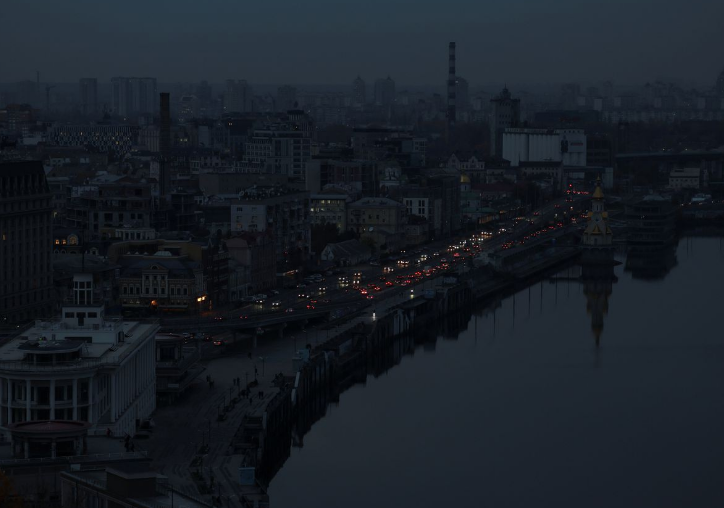Ukrainian Authorities Announce Longer Power Cuts After Continued Air Strikes
Smoke visible in the distance on the outskirts of Kyiv, after another Russian missile attack targets key Ukrainian power infrastructure, Oct. 18, 2022. Photo: Reuters/Anna Voitenko
Ukrainian authorities warned Kyiv residents on Saturday, Oct. 29, of longer anticipated power cuts – lasting more than four hours – due to prolonged Russian air attacks on energy infrastructure.
Rolling power cuts are common occurrences not only in Kyiv but in other major cities like Lviv, Zaporizhzhia, Kharkiv, and beyond. They have been a reality for Ukrainians ever since Russia began seeking retribution for the Oct. 8 Crimea Bridge explosion initiated by Ukraine. President Zelenskyy said that the official number of Ukrainians affected is currently about four million, with over one-third of power stations destroyed since Russia started its drone and missile-based offensive. Zelenskyy reassured the Ukrainian people that “shelling will not break [them].”
On Oct. 22, a new record was made for the number of missiles and drones that hit Ukraine in one day and the subsequent number of households that lost power. It is almost certain that the record will soon be broken (if it hasn’t been already).
Meanwhile, Ukrainians have been getting creative with how they manage the difficult situation. Some have started leaving “survival kits” inside elevators of high-rise buildings, which are bound to get stuck in a power outage. One man in Kyiv has equipped his kits with essentials like water, energy bars, a torch, a container for going to the bathroom, toys for kids, and a cushion for sitting. In the town of Rivne, patients in the municipal hospital are being fed food that is cooked over wood stoves on the sidewalk, according to the hospital’s deputy head Dr. Ihor Dundiuk.
While extensive outages might have been tolerable during the summer and early fall months (with sufficient planning), wintertime looks foreboding. Ukrainian Deputy Prime Minister Iryna Vereshchuk urged all refugees abroad not to return until spring, so as to avoid adding excess pressure onto the infrastructure and to be more certain they can provide heating for themselves and their families during the upcoming season.
Kyiv’s city center on Oct. 24, completely without power amidst rolling power cuts in the country. Photo: Reuters/Gleb Garanich
Some Ukrainians from smaller towns like Kivsharivka have been without gas, water, or electricity for much longer than four mere hours, however. Residents have had to cook outdoors, bundle in blankets, or keep warm with wood-burning stoves for more than two weeks at a time, due to irreparable utility damages in their area.
There are significant difficulties involved in repairing the damaged power grids, since it’s often hard to find the same power station parts as those that were hit. Persistent attempts have been made, however: according to transmission system operator UkrEnergo, “70 repair teams [have been] working around the country non-stop” in the recent weeks.
Amnesty International’s Director for Eastern Europe and Central Asia Marie Struthers called Russia’s deliberate targeting of Ukrainian infrastructure “unlawful,” further stating that Russia “intends to undermine industrial production, disrupt transportation, sow fear and despair and deprive civilians in Ukraine of heat, electricity and water as the cold grip of winter approaches.”
While it might have been successful in destabilizing some of Ukraine’s tangible utilities, Russia has not yet prevailed in its mission to sow fear and despair among the Ukrainian populace. Clearly, individuals and businesses are pitching in as best they can to conserve energy resources while continuing to meet their basic needs and helping others do so, too.


